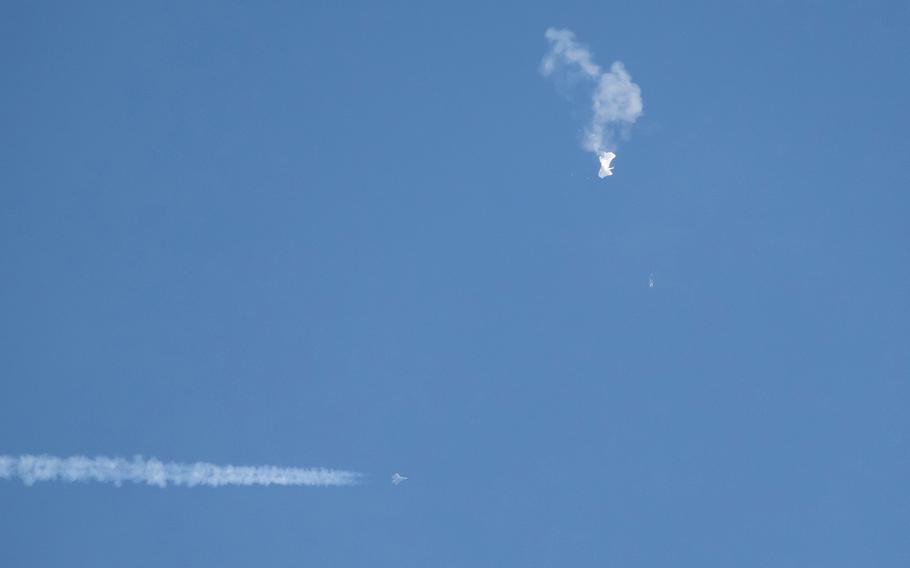U.S.
US moves to recover Chinese balloon while weighing retaliation
Bloomberg News February 6, 2023

Debris falling from the sky after a Chinese spy balloon was shot down by an F22 military fighter jet over Surfside Beach, South Carolina, Saturday, Feb. 4, 2023. (Joe Granita)
WASHINGTON — The U.S. government launched a mission to salvage what officials say is spy equipment from the Chinese balloon shot down off the coast of South Carolina on Saturday, as pressure mounted on President Joe Biden to hit back at Beijing over the incident with new export controls on sensitive technology.
The government anticipates finding equipment capable of taking detailed photographs, along with other sensors, one person familiar with the matter said. U.S. lawmakers are already demanding to know if the balloon's payload contains technology from the U.S. or its allies, another person said. Both asked not to be identified because the administration doesn't want to reveal exactly what it suspects the balloon was carrying.
The balloon, said to be the size of at least two school buses, and its sensors are lying in 50 feet of water and scattered over a seven-mile area off Myrtle Beach. Divers and cranes operating from the surface were expected to haul it up in the coming days, potentially giving intelligence analysts crucial insight into Chinese spying capabilities.
China says it was nothing more than a weather-monitoring balloon that strayed off course, while the U.S. insists it was much more, and part of a broader spying plan by the Chinese government. With that in mind, people familiar with the matter said the Biden administration was calibrating how severely and swiftly to retaliate.
In a sign of the new tensions likely to come, China's Foreign Ministry sharpened its tone on Sunday and said it now reserves the right to respond after a U.S. F-22 fighter jet popped the balloon with a Sidewinder missile and sent its payload crashing into the ocean. Beijing said the U.S. violated international practices after an accidental incursion by the balloon. "China will resolutely safeguard the legitimate rights and interests of the company concerned, and reserves the right to make further responses if necessary," the foreign ministry said in a statement.
The international back-and-forth was a reminder that while the balloon may have come crashing down, the bizarre spying saga that surrounded it is far from over. Biden will almost certainly make reference to the episode in his State of the Union speech on Tuesday, another person familiar with the matter said.
Blinken's trip
One option is to send Secretary of State Antony Blinken to China with a much tougher message than the one he had planned to bring this week, before he postponed the trip when the balloon's presence over the U.S. was disclosed.
People familiar with the matter said he didn't want to risk the public relations disaster of landing in Beijing while the balloon was still in the air over U.S. territory. But now the administration believes Blinken should return soon. They argue for a much tougher approach both on the balloon and evidence the U.S. has that officials say shows Chinese companies have been quietly supporting Russia's war effort in Ukraine.
The episode is already ratcheting up pressure on the administration to push even harder with its existing strategy of trying to hobble China's ability to access an array of high-tech semiconductors used in sophisticated military applications, as well as the valuable equipment used to manufacture such chips.
And even if it doesn't spur specific new measures, the embarrassingly public act of alleged espionage has made it more difficult for the U.S. and China to stabilize diplomatic ties over thorny issues such as Taiwan, particularly with the Biden administration facing growing pressure from critics and a Republican-controlled Congress.
Senate Majority Leader Chuck Schumer, a New York Democrat, said senators will get a full classified briefing on Feb. 15, which will give the administration time to collect and sort through the evidence to back up its claim.
"The bottom line here is that shooting down the balloon over water wasn't just the safest option, but it was the one that maximized our intel gain," Schumer said in a statement.
Balloons like the one blown apart Saturday are not uncommon, but this time the Chinese made a mistake by flying it low enough to be spotted by commercial pilots and people on the ground, according to one person familiar with the matter. Typically balloons like the one shot down fly above 80,000 feet and as high as 100,000 feet.
The administration has already faced fierce GOP criticism in recent days for being weak on China and not shooting down the balloon sooner. U.S. officials argued that it simply wasn't safe to bring the floating orb down over land when it was carrying a large and heavy payload.
The administration may not feel the need to level any other immediate consequences on Beijing for the episode given that U.S. officials are comfortable with their broader position in terms of competition with China. The person familiar with the administration's thinking on the matter cited work already underway on further export controls and tightened investment restrictions on strategic sectors in China.
Starting in October, the Biden administration rolled out tough export controls against China that have curtailed Beijing's ability to access high-end semiconductors, and the U.S. has only closed the vice more tightly since — including signing up nations to the effort such as the Netherlands and Japan, whose firms manufacture some of those chips.
With assistance from Peter Martin and Victoria Cavaliere.
©2023 Bloomberg L.P.
Visit bloomberg.com.
Distributed by Tribune Content Agency, LLC.